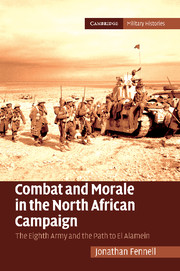Book contents
- Frontmatter
- Contents
- List of illustrations
- List of figures
- List of maps
- List of tables
- Acknowledgements
- List of abbreviations
- Maps
- Introduction
- 1 Morale crisis and recovery
- 2 Technology, firepower and morale
- 3 Quality of manpower and morale
- 4 Environment, provisions and morale
- 5 Welfare, education and morale
- 6 Leadership, command and morale
- 7 Training and morale
- 8 In search of a theory to explain combat morale in the desert
- Conclusion
- Appendix: Battle maps
- Bibliography
- Index
- References
3 - Quality of manpower and morale
Published online by Cambridge University Press: 24 February 2011
- Frontmatter
- Contents
- List of illustrations
- List of figures
- List of maps
- List of tables
- Acknowledgements
- List of abbreviations
- Maps
- Introduction
- 1 Morale crisis and recovery
- 2 Technology, firepower and morale
- 3 Quality of manpower and morale
- 4 Environment, provisions and morale
- 5 Welfare, education and morale
- 6 Leadership, command and morale
- 7 Training and morale
- 8 In search of a theory to explain combat morale in the desert
- Conclusion
- Appendix: Battle maps
- Bibliography
- Index
- References
Summary
Men and women remain the most important assets of an Army, even since the development of modern weapons. Economy of manpower means much more than operating with the smallest numbers possible; it is also essential to use every man and woman to the best advantage.
(General Ronald Adam)The object of training must be, firstly, to select those who possess within them the potentialities of leadership and, secondly, to develop these potentialities.
(Field Marshal B. L. Montgomery)We seem to have plenty of people who can read orders literally but precious few who can interpret them intelligently which is far from the same thing. According to the press I see every time British Forces take it in the teeth and get shoved back from or off of something, a howl goes up from the B[ritish].P[ublic]. to Govt. about supplies and quality or quantity of tanks, guns etc. Now however true that may have been I do not believe it to be the main fault now. In my considered opinion – here's high heresy – the fault in main lies from top to bottom with the personnel!
(An officer commenting on the summer 1942 crisis in the desert)In 1922, the Southborough Committee on Shell Shock unequivocally concluded that many of the manpower problems that had beset the British Army in the First World War could be overcome in a future war by better personnel selection and manpower policies.
- Type
- Chapter
- Information
- Combat and Morale in the North African CampaignThe Eighth Army and the Path to El Alamein, pp. 95 - 123Publisher: Cambridge University PressPrint publication year: 2011



